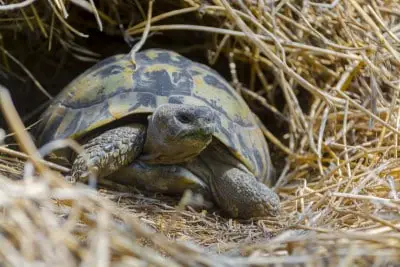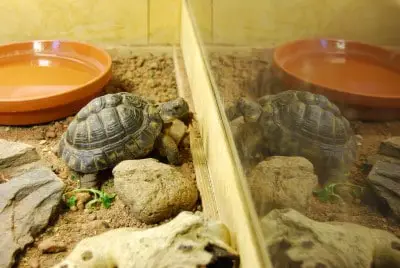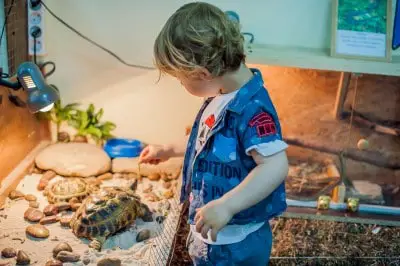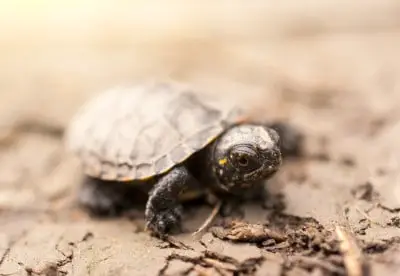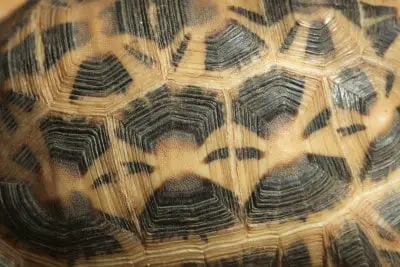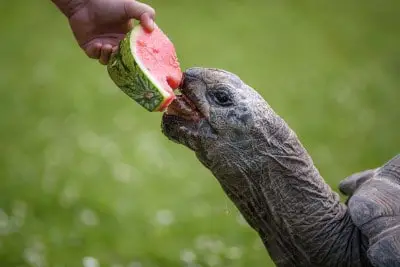As a pet owner, you would want to know your pet’s intellectual ability; perhaps, whether they can remember you or learn tricks. As a turtle or tortoise owner, you may have noticed that it is not easy to gauge their intelligence. However, with close supervision and intensive research, you may be surprised by the results.
Turtles and tortoises are intelligent creatures based on their ability to perceive emotions, recognize their owners, and fend for themselves. They also feel fear, happiness, anger, and fondness for their owners. Also, you can use treats to train them to do simple tricks, although they will learn at a slow pace.
It is pretty interesting to understand your favorite pet’s brainpower. Read on as we uncover your reptiles’ cognitive and problem-solving skills, memory, and spatial senses.
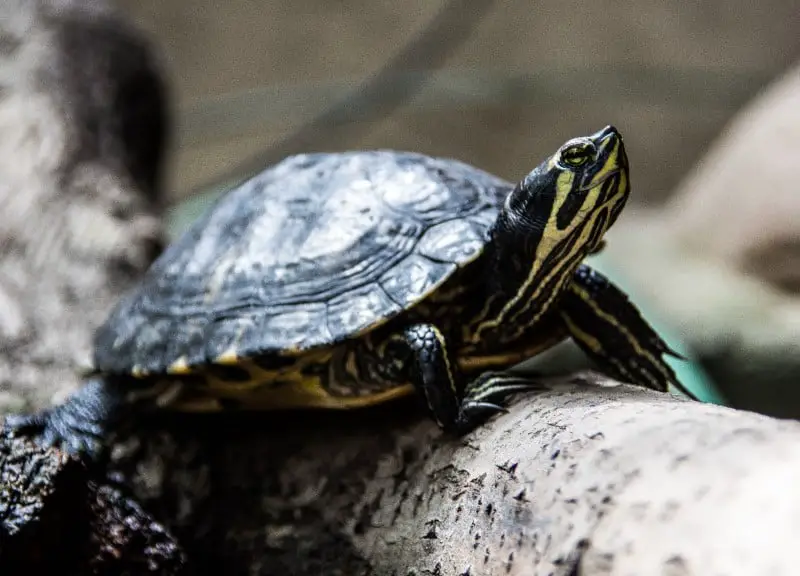
Are Tortoises and Turtles Smart?
It is easier to rank a human’s IQ and intellect; however, it’s complex with animals, especially exotic species like tortoises and turtles. Using specific pre-existing methods such as communication, problem-solving, and the ability to pick up new skills, we can finally understand how the reptiles’ brains work.
According to research, tortoises and turtles have a strong spatial sense and are pretty intelligent. They can comfortably survive living alone in their natural setting by hunting for food and using unique escape tactics to avoid predators. For instance, tortoises retreat into their shells when they sense danger; they may not be fast, but their shell and intelligence make up for it. They can also learn from their experiences to help them in the future. Surprisingly, they also have tremendous problem-solving skills; in that, they figure out where they found food last, and females return to the same spot where they had laid eggs.
There are several reasons to confirm that tortoises and turtles are pretty smart. Besides the innate instinctive intelligence, they also present incredible problem-solving skills to help them hunt and escape predators. Aquatic turtles, for instance, travel miles annually while looking for food, mates, and better habitat. They also remember the best environments, especially females who recognize the safe spots to lay eggs, and hatchlings recognize where they hatched. Similarly, sea turtles naturally go ashore at night when they are sure that predators will not lurk at night.
Primarily, turtles and tortoises are born with intuitive skills for their survival. Additionally, as they get older, they learn from their experiences to remember how they handled the previous situation. Therefore, you can introduce your turtle to various skills, and it will learn, although not as fast as other mammal pets.
Different species have different intellectual abilities. For instance, red-eared sliders are among the most intelligent species, with some owners sure that they recognize voices and respond to their names. Tortoises and semi-aquatic turtle species like the box turtles are even more surprising with their ability to remember the critical aspects of their survival, such as safe spots and hunting grounds.
Read more: Are Tortoises Good Pets? Pros And Cons You Need To Know
Do Turtles and Tortoises Have Feelings?
The main reason for having a pet is companionship. Therefore, every owner’s dream is for their tortoise or turtle to return the affection, recognize, and approach them when they hear their name. Let’s find out whether your pet can love you right back.
Tortoises and turtles have brains; therefore, they can feel various emotions depending on their circumstances. They may not express it as mammal pets do, but they use body language and sound to show their feelings. The longer you live with your pet, the faster they develop trust and get comfortable in your presence.
In their natural setup, these reptiles associate their emotions with survival; therefore, their primary and most detectable feelings are pain and fear. They can feel sad and frustrated after a long period without successful hunting, fear when they spot a predator, and joy when they mingle with each other or find food.
Unlike what most people believe, these reptiles experience complex emotions just as mammals do; the only difference is that they don’t express it as clearly. Hence, it is quite tasking to understand how their brains work, and some scientists attest that they are uncertain about their emotional capacity. The good news is that they can show affection to their owners, especially after living together for a long time. You may see excitement, loneliness, aggression among males, and fear when they contact strangers.
For one, you may notice your pet stretching its neck when you rub it or as it sinks into your touch when you stroke its shell. It may be their unique way of showing how they feel, but some experts seem to disagree. For them, tortoises and turtles only seem excited when you approach them because they associate their owners with food. Therefore, whenever they lean into your hands or come when you call, they only do it to obtain food or tasty treats.
Can You Train Tortoises and Turtles?
Mammal pets are easier to train since they quickly pick up tricks and are more expressive. On the other hand, turtles and tortoises seem to love their privacy and rarely interact with humans. We investigated their ability to recognize patterns and learn new things.
You can train a tortoise the same way you would train a dog. The most effective method is the use of treats as motivation to do what you ask. The only downside is that they are not as fast learners as other pets and are not very expressive or active.
However, it would work best if you are persistent since they take a while to keep up. They mostly associate you with food, and when you insist on training them and providing their favorite treats, they will gladly follow your directions. Similarly, you will notice that they seem excited whenever you approach; any time they see you, they will know that it’s feeding time.
With time, some owners state that their pets can recognize them. As research has it, tortoises and turtles get fond of their food providers, not necessarily because they are brilliant, but because they are happy to get their meals. You can use this to your advantage to establish a bond and train them gradually. The trick is to select the foods they love the most. However, we warn that it isn’t for the faint-hearted. It is best to try it when you want to spend more time with them and not simply because you want to see instant results.
However, your pet can only do simple tricks; don’t expect a high-speed game of fetch. It may crawl into a box on command, stretch its limbs for claw-clipping, or come to you when you call. Additionally, it can initiate stroking when you reach out your hand to show compassion.
You may also find your pet hovering around you when it has mastered feeding times. Therefore, training these reptiles centers on their need for survival; hence, you can explore some fun activities together once you find their favorite foods.
Do Turtles and Tortoises Have Memory?
Another way to measure an animal’s intelligence is by considering its ability to remember occurrences. Intelligent creatures usually retain their memories to help in decision-making and survival. If an animal is smart enough to remember happenings in the recent past, it only means that it can also solve future problems.
These reptiles have impressive memories, especially short-term. Primarily, they are keener on remembering essential aspects to their survival, such as food, habitat, and predators. In their natural habitat, they will remember where they last hunted and where they were in contact with a predator.
It helps them stay alive as it comes in handy during hunting and evading predators. The more you two interact in captivity, the more they become fond of your presence and register you as a friend in their memory. Instinctively, they usually recognize their owners as one reason for survival as they provide food.
Experts say that the reptiles are pretty selective in their memory because they only remember the most critical incidents. If the occurrence helped them find food, shelter, or keep safe from attacks, trust that they will etch it in their memory. Secondly, they only remember what happened recently but forget distant pasts.
For instance, if you two have already formed a bond but leave for a while, it will take a while to re-establish trust when you reunite. These reptiles will also create memories based on observation. As long as they see the occurrence as vital in their survival, they will remember it, though for a short period.
Finally
Tortoises and turtles are not dumb. They are pretty smart once you get to know them. Their brains are complex enough to understand emotions, recognize their owners, and retain short-span memories. Naturally, the reptiles express fear, anger, and contentment.
They are afraid of predators, show hostility during fights, and feel happy when they find food. When you take care of them for a long time, they can recognize you as their owner. Mainly, they pay more attention to the critical aspects of their lives, especially food. Therefore, they can memorize you as their food source and learn tricks when you train them with treats.

